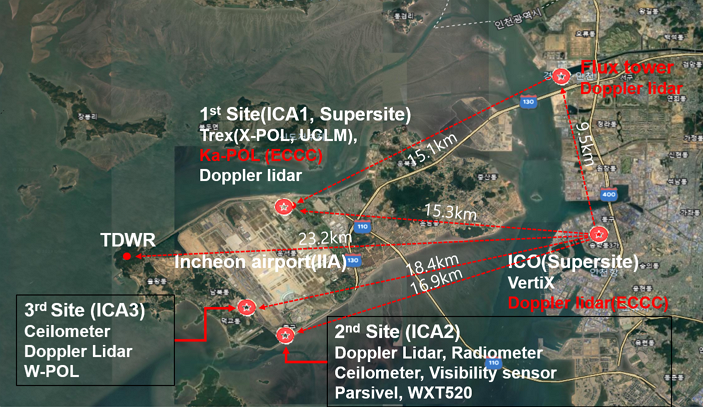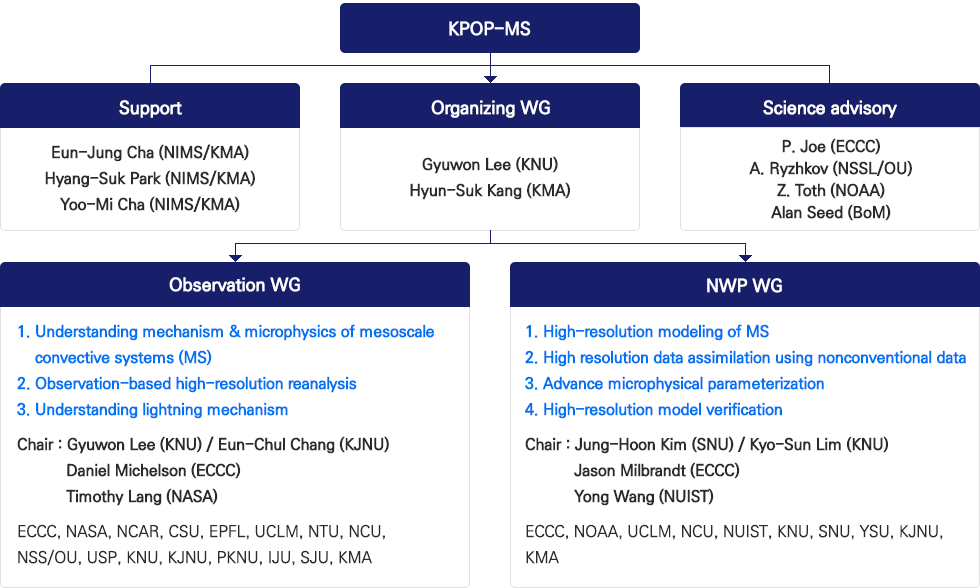KPOP-MS
Korea Precipitation Observation Program (KPOP): International collaborative experiments for Mesoscale convective system in Seoul metropolitan area (MS)
Korean Peninsula experiences very complex convective precipitation systems, Mesoscale Convective System (MCS), accompanied by moisture rich flow (“Atmospheric River”) due to microscale/mesoscale (and/or synoptic) forcing and complex topography. The following is an example of this complex systems that produces a record-breaking rainfall over Seoul metropolitan and nearby areas.
A record breaking rainfall event on 8 to 11 August, 2022

KPOP-MS (Korea Precipitation Observation Program: International collaborative experiments for Mesoscale convective system in Seoul metropolitan area) is an international collaborative field experiment, initiated by the Korea Meteorological Administration (KMA), to understand physical/dynamical processes and improve forecast accuracy of mesoscale convective systems in moisture rich environment.
The scientific objectives are:
- 1. To generate valuable, reliable, and accessible dynamical, thermodynamical, and hydrometeorological observation data and high-resolution analysis data for mesoscale convective systems.
- 2. To understand dynamical and microphysical processes over heterogeneous surface (ocean, tideland, farmland, urban, and mountains) in convective environment with multi-frequency remote sensing and dense microphysical observations.
- 3. To develop (ultra)high-resolution data assimilation by incorporating new observation technologies and dense boundary layer observations such as scanning Doppler lidar, scanning temperature and water vapor Raman lidar, dual-polarimetric radar, wind profiler, lightning mapping array, and dense surface network (AWS, IoT etc).
- 4. To develop a feedback system of Observation-Analysis-Modeling-Verification for identifying valid reasons of forecast failure and furthermore improve forecasting accuracy.
- 5. To advance physical processes and their parameterization of warm/cold microphysics and surface processes for mesoscale convective systems.
We implemented intensive observational networks of upper air sounding (rawinsonde, storm tracker, drop sounding, ship sounding, etc), remote sending (Doppler lidars, cloud radars, weather radars, wind profilers, etc), microphysical observation (Meteorological Particle Spectrometer, 2-dimensional video distrometer, Parsivel, micro rain radar, etc), lightning mapping array (LMA), etc. The layout of instrumentations is shown below:

In particular, the supersites are setup around the Incheon international airport and Incheon weather observatory with various in-situ and remote sensing instrumentations to fully observe all-weather conditions.
Supersites

About 13 foreign organizations from 9 countries are participating into this project. The structure of KPOP-MS is composed of Organizing Working Group (WG) [observation and numerical weather prediction (NWP) WGs], Science advisory and Support (below).

Structure of KPOP-MS
The two major field experiments will be performed in June to September 2023 and 2026 with continuous observation of available instrumentations from the KMA, domestic universities, and foreign institutions. If you are interested in this international experiment, please contact Prof. Gyuwon Lee, Kyungpook National University (email: gyuwon.lee at gmail.com).



 Login
Login 
